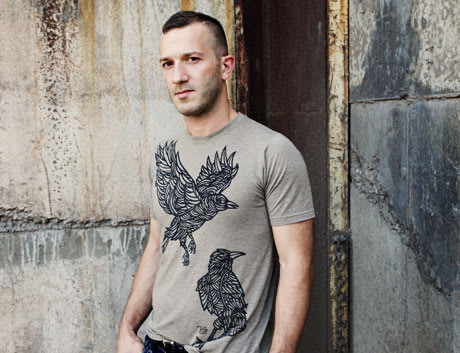"I didn't think that it would be making the rounds so much as it is," understates Colin Stetson about his next level New History Warfare Vol. 2: Judges, which came up short (listed) for the Polaris Music Prize this year but still won big in its own way. Having snuck quietly out of the gate in February, the album built crazy momentum in subsequent months. Judges marked Stetson's new mastery of his own techniques in circular breathing for the rarely used bass saxophone. More significantly, however, it has become an entry point for new ears into contemporary composition and the saxophone in general. His new disc, the ten-inch EP Those That Didn't Run (Constellation) builds on his success.
Most saxophonists hope for steady work, but rarely has such an extreme instrumentalist gotten so many high profile gigs, from fellow Polaris Prize short listers Arcade Fire and Timber Timbre, to Tom Waits, TV On The Radio and Bon Iver, with whom he's touring until the end of next year. Stetson says "I don't have time to do anywhere near all the things that I'm getting offered," he says. "It's a good predicament to be in. I'm in an extremely fortunate position right now."
His new release is well timed; barely two weeks removed from the Polaris Music Prize gala. For those who may have wondered how Stetson could possibly have advanced his technique, this EP delivers more angry bass, punk-ish echoes and sing-able ― or at least scream-able ― moments that transcend genre. "The EP has elements that physically I wasn't able to get to when I was creating Vol. 2. Circular breathing on a bass saxophone for 11 minutes wasn't something I could do on the last record." Anyone who's witnessed one of Stetson's solo shows knows it doesn't come easily. "My regimen is pretty steep. I have a multi-tiered daily thing. I do an hour long breathing exercise that is rooted in yogic breath work, I usually go for a three-to-five mile jog and I do at least an hour of yoga a day. Then I practice." The payoff: "Things that I couldn't gain control of back then are now being brought into songs."
With Stetson's growing popularity comes a backlash that alleges he's not all that original. Stetson takes it in stride. "Canada, one of the reasons they love it there so much," he begins, then pauses as he reconsiders his choice of words as a recently-minted permanent resident, "is that we're more on the cutting edge of open ears and open minds when it comes to the big picture in music. Everything I'm doing is not new." Even though he shuns the lazy characterization of his music as jazz, he notes: "People have been doing circular breathing, multiphonics and singing through the instrument in free jazz for decades. I've been bringing it further into the mainstream. It would be really beautiful if I could open up some ears and minds to things that have come before and are still going on that maybe haven't been in the foreground."
Most saxophonists hope for steady work, but rarely has such an extreme instrumentalist gotten so many high profile gigs, from fellow Polaris Prize short listers Arcade Fire and Timber Timbre, to Tom Waits, TV On The Radio and Bon Iver, with whom he's touring until the end of next year. Stetson says "I don't have time to do anywhere near all the things that I'm getting offered," he says. "It's a good predicament to be in. I'm in an extremely fortunate position right now."
His new release is well timed; barely two weeks removed from the Polaris Music Prize gala. For those who may have wondered how Stetson could possibly have advanced his technique, this EP delivers more angry bass, punk-ish echoes and sing-able ― or at least scream-able ― moments that transcend genre. "The EP has elements that physically I wasn't able to get to when I was creating Vol. 2. Circular breathing on a bass saxophone for 11 minutes wasn't something I could do on the last record." Anyone who's witnessed one of Stetson's solo shows knows it doesn't come easily. "My regimen is pretty steep. I have a multi-tiered daily thing. I do an hour long breathing exercise that is rooted in yogic breath work, I usually go for a three-to-five mile jog and I do at least an hour of yoga a day. Then I practice." The payoff: "Things that I couldn't gain control of back then are now being brought into songs."
With Stetson's growing popularity comes a backlash that alleges he's not all that original. Stetson takes it in stride. "Canada, one of the reasons they love it there so much," he begins, then pauses as he reconsiders his choice of words as a recently-minted permanent resident, "is that we're more on the cutting edge of open ears and open minds when it comes to the big picture in music. Everything I'm doing is not new." Even though he shuns the lazy characterization of his music as jazz, he notes: "People have been doing circular breathing, multiphonics and singing through the instrument in free jazz for decades. I've been bringing it further into the mainstream. It would be really beautiful if I could open up some ears and minds to things that have come before and are still going on that maybe haven't been in the foreground."
